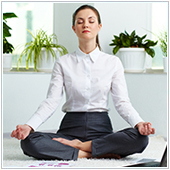 When the symptoms of anxiety and depression are left untreated, they can lead to deterioration of relationships and subsequently, collapse in quality of life. Although many prescription drugs and therapies exist to treat anxiety and depression, many people prefer meditation over medication.
When the symptoms of anxiety and depression are left untreated, they can lead to deterioration of relationships and subsequently, collapse in quality of life. Although many prescription drugs and therapies exist to treat anxiety and depression, many people prefer meditation over medication.
Believe it or not, the results of a study conducted by the Division of General Internal Medicine at John Hopkins University School of Medicine suggests that meditation relieves some symptoms of anxiety and depression on a level similar to antidepressant medications. Depending on the severity of the symptoms you are experiencing, meditation may be a good first attempt at alleviating some stress and anxiety in your life.
What is meditation?
Meditation refers to a set of techniques that brings about a deep state of mind and body relaxation. It has been around for thousands of years already and continues to grow in popularity due to the increasing number of daily stressors in our everyday lives. During meditation, the flow of negative thoughts is halted in order to create space for relaxation. It is said that meditation heals the body and mind in a complementary manner.
How can meditation ease anxiety and depression symptoms?
Anxiety and depression can be caused by various situations such as loss of a job, a traumatic accident or failure to achieve goals. While life’s ups and downs are inevitable, the most important thing is your willingness to recover. Meditation has a high level of effectiveness when performed on a regular basis. It is cost-effective and has no negative side effects.
Here’s a snapshot of what you may experience after meditating on a regular basis:
-
Release of negative thoughts that can act as stressors
-
New focus on solutions rather than problems
-
A more relaxed body
-
The ability to identify the root cause of your anxiety or depression
-
A fresh, new perspective
Meditation may refer to any mind and body relaxation technique. There are various types of meditation and you are free to choose which one works best for you.
Here are 6 popular types of meditation.
-
Guided meditation: You will be asked to visualize a soothing image or situation with the guidance of a professional or an instructor.
-
Mantra meditation: You will utter a word or phrase that is calming or motivating to block destructive thoughts.
-
Qi-gong: Considered a part of Chinese traditional medicine, Qi-gong merges breathing exercises, silent meditation and physical movements to regain and uphold balance.
-
Tai Chi: It is a combination of deep breathing and slow, graceful movements.
-
Transcendental meditation: You will recite a certain mantra to promote focus, consciousness and tranquility.
-
Yoga: You will practice a combination of breathing exercises and postures that promote balance, concentration and flexibility.
Is meditation for everyone?
Daily meditation can be helpful for anyone. If you’re feeling stressed, a meditation session may be just what you need. But for those who have been diagnosed with anxiety or depression, meditation may not be able to replace the medications your doctor has prescribed for you. For best results, begin by combining meditation with your usual medications and natural supplements. And don’t hesitate to speak with your pharmacist at [company_short] or by calling [phone_main] for personalized recommendations.